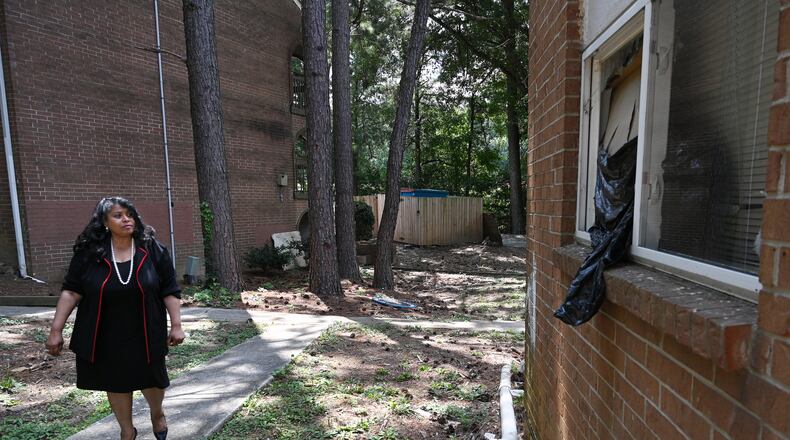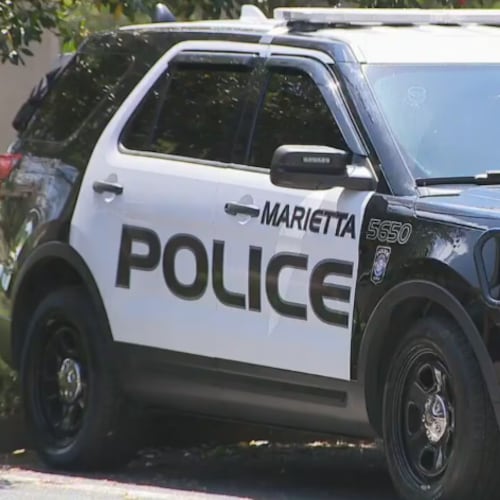When the shooting stopped at the Forest Cove apartments early Monday, five people had been wounded. One was just 13 years old. Another, the police said, was a teenager who suffered “very critical” injuries.
But for Forest Cove, this burst of violence was hardly shocking.
Nineteen homicides have occurred at the southeast Atlanta complex since 2009, more than at any other location in the city. The property has been condemned because of crime and disrepair. And just last week, Atlanta and Fulton County prosecutors named Forest Cove as one of 43 complexes they have targeted in a campaign against persistently dangerous and unhealthy apartments.
The shooting underscores the urgency in that effort, a response to an investigation by The Atlanta Journal-Constitution. The newspaper’s series, Dangerous Dwellings, reported last month that weak government regulation has enabled negligent landlords across metro Atlanta to operate barely habitable apartment complexes, many of them beset both by violent crime and by horrific living conditions.
“Some of these apartment owners have embraced this as normality,” said Erika Smith, Atlanta’s deputy city solicitor. “We cannot have that in the city of Atlanta.”
The crackdown is an acknowledgement that a fragmented approach to overseeing rental housing has failed to protect tens of thousands of residents, many of them children.
“There are so many jurisdictions and so many nuances to this problem,” said Keisha Sean Waites, an at-large member of the Atlanta City Council. “Everybody’s doing something, but nobody knows what the other person is doing.”
The solicitor’s office prosecutes violations of the city housing code in Atlanta Municipal Court, while the district attorney’s office handles cases involving violent crime, drug trafficking, prostitution or gang activity. For the first time, the two offices have shared information that showed crime problems and code violations often plague the same complexes.
“We’ve been aware of them on property management issues, not so much on crime,” Smith said. “We need to work together rather than in silos. We can help one another.”
Officials released the list of the 43 complexes Friday at a meeting of several City Council members, Atlanta Solicitor Raines Carter, police officials and Fulton County District Attorney Fani Willis — who said her office is going into “war mode.”
“We must take action against landlords whose property is unsafe due to a failure to address criminal activity they know, or should know, is occurring on their property,” Willis said in a statement on Monday. “We can bring to this fight powerful tools, including Georgia’s anti-gang and anti-human trafficking laws, as well as our RICO statute. Those laws allow us to seek stiff sentences for those committing violent crimes at these properties, as well as to take action to seize property from landlords who are negligent or worse regarding the crimes happening on their property.”
Still, details remain sketchy. The list of targeted complexes is not final, Smith said, and strategies for attacking the problem are still being drafted. Other properties with high crime and numerous code violations, such as nightclubs and gas stations, will also be targeted.
“It’s not just apartment complexes,” Smith said. “This is way more extensive than just apartment complexes.”
Numerous troubled complexes identified by the Journal-Constitution did not appear on the officials’ list. They include Venetian Hills, a 59-year-old complex on Campbellton Road in southwest Atlanta, where homicides occurred in 2014, 2015, 2016 and 2017. A 5-year-old was shot and wounded there in January. And in 2017, a resident died from a fire caused by arson.
A complex called 33Ninety, on Fairburn Road, was the scene of a 2021 homicide and a 2021 shooting that sent a bullet through the wall of an elderly resident’s apartment. Several tenants have complained to the city’s code-enforcement agency about mold in their apartments. Last year, another resident reported having no bathroom sink as well as a sewage leak outside the front door. And at the Metropolitan, a complex on Metropolitan Parkway, five homicides occurred between 2016 and 2019, and residents reported 55 possible housing-code violations during the same period. Those complexes were among more than 250 the Journal-Constitution identified in Fulton, Cobb, DeKalb, Gwinnett and Clayton counties.
Regardless, Atlanta City Council members found the list of 43 complexes to be a compelling call for action.
Councilman Dustin Hills, who chairs the public safety committee, said he has been trying to improve conditions at Woodland Heights, formerly known as Rolling Bends, for years.
Why no one has addressed dangerous apartments in a systemic way yet is unclear.
“That’s the million dollar question, isn’t it?” Hillis said.
The current, California-based owners promised him three years ago that they would improve conditions, but black mold, severe safety problems and other issues exist.
“First and foremost, we have to show we’re serious about this,” Hillis said. This could mean levying tougher fines, developing an inter-agency “strike force” that works full time on the issue, and coordinating among agencies, including state and federal authorities, to make sure enforcement is effective.
On Friday, Councilwoman Andrea Boone went door-to-door at the Vue at Harwell in her southwest Atlanta district. Residents showed her fungus growing from a carpet, mold and mildew in a dishwasher that would not wash away, and trash strewn across the complex.
“It’s worse than we thought,” Boone said.
Boone wants to make an example of negligent owners by putting them in jail. She mentioned the owner of the Fairburn Gordon complex on Fairburn Road: Behzad Beroukhai, a real-estate investor from Beverly Hills, California, who also owns Pavilion Place on Cleveland Avenue. The Journal-Constitution series reported that Beroukhai has repeatedly failed to appear in Municipal Court to answer dozens of criminal complaints alleging housing-code violations. Beroukhai is a part or full owner of six complexes inside the Atlanta city limits; all made the list of 43 properties.
Credit: Danielle Russell
Credit: Danielle Russell
“We need to fly that guy in, and we need to prosecute him,” Boone said.
But housing activists aren’t sure that’s the best approach.
It’s hard for a landlord to improve conditions from a jail cell, and many owners may decide to sell to another negligent landlord instead of improving conditions, said Alison Johnson, executive director of the Housing Justice League, which helps tenants organize to advocate for more rights and better conditions. The city may end up having to find new homes for hundreds of residents, or running an apartment complex it does not have the staff, skills or money to manage, Johnson said.
Instead, she said, the city needs to ensure that tenants have safe, decent housing, without getting forced from their communities.
“The solution for us is not to lock anybody up,” she said. “Not that some of them don’t deserve it.”
Keep Reading
The Latest
Featured






